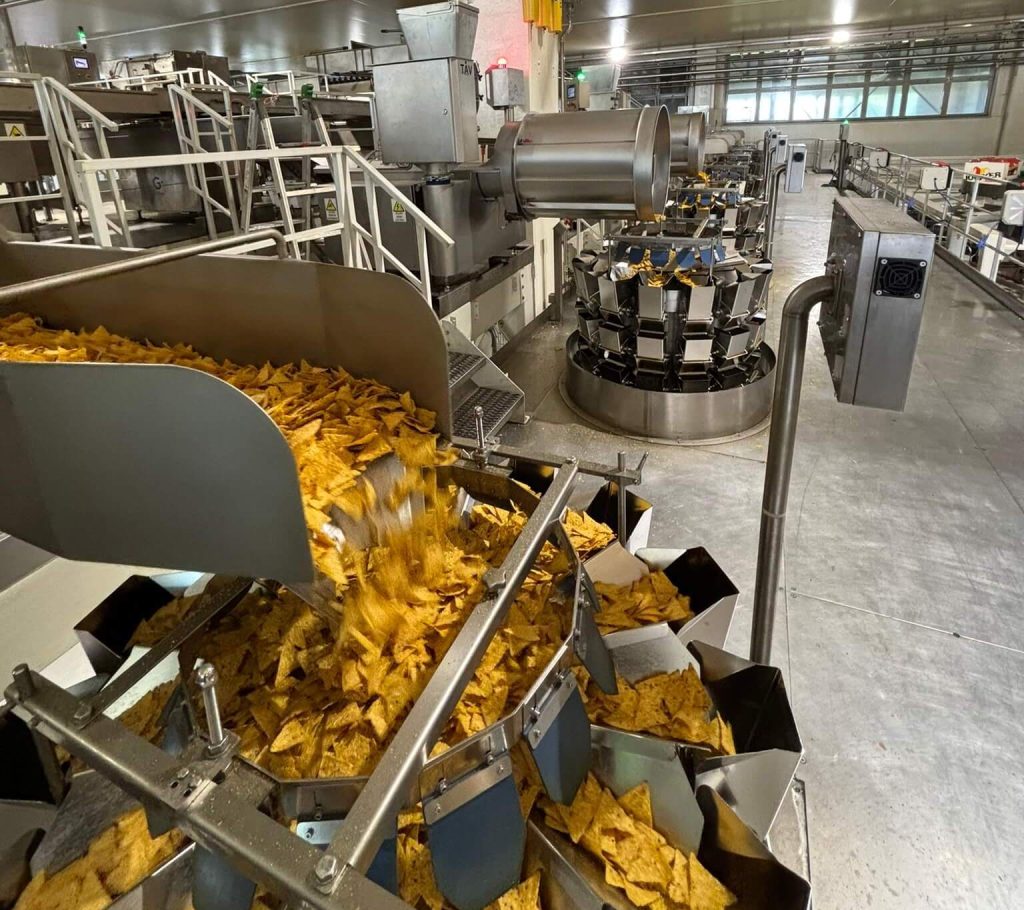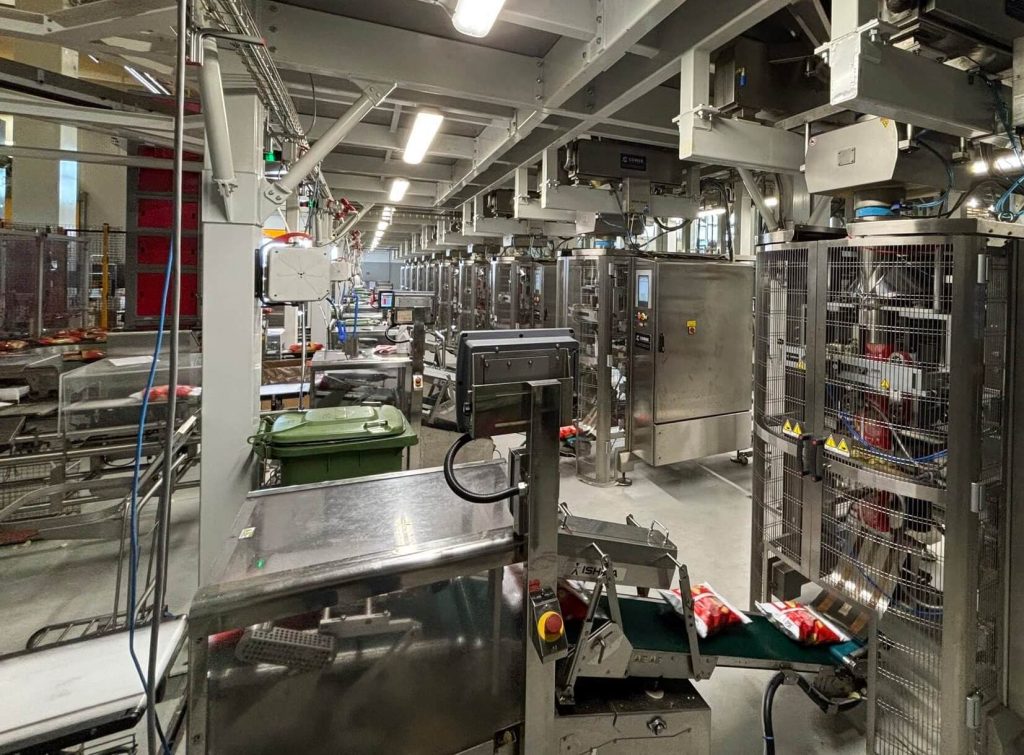ESG-Italy: your partner in snack manufacturing
At ESG-Italy, we specialize in designing and supplying snack production lines, assisting manufacturers in establishing efficient, high-quality, and sustainable snack facilities. With headquarters in Italy and a regional office in Dubai under ESG-Middle East, we bring decades of expertise in manufacturing equipment for tortilla chips, potato chips, popcorn, pretzels, extruded snacks, and more.
As tortilla chips continue to gain popularity worldwide, we provide comprehensive solutions to help manufacturers establish or optimize their tortilla chip production lines, ensuring efficiency, profitability, and sustainability. Several leading manufacturers in the Middle East have already begun exploring this opportunity, recognizing the potential of this fast-growing segment. Now, let’s take a closer look at why tortilla chips are a smart investment and how you can set up your production line for success.

Tortilla chips: a rising trend in the global snack market
Once a staple of Mexican cuisine, tortilla chips have evolved into a global snack phenomenon, loved for their crunch, versatility, and shareability. From family gatherings to social media-driven food trends, tortilla chips have become a go-to snack for consumers worldwide, offering a healthier alternative to traditional fried snacks.
With the global tortilla chip market valued at $27.3 billion in 2023, predicting rapid expansion, reaching $48.7 billion by 2030, with an 8.8% CAGR (Tortilla Chips Market Size, Share and Growth Report, 2030, 2024). This surge is driven by the growing demand for healthier, plant-based, and gluten-free snacks, making tortilla chips a smart investment for manufacturers looking to tap into a booming industry.
In the Middle East, where the food industry is expanding rapidly, tortilla chips present a lucrative opportunity. Several major snack manufacturers in the region are actively exploring this segment to diversify their portfolios.
This growing interest stems from the fact that tortilla chips have historically been dominated by a single global producer, leaving enormous potential for local and regional manufacturers to establish themselves in the market. Unlike other snack products that require hard-to-source ingredients, tortilla chips can be produced with widely available raw materials.
Additionally, while their energy consumption is comparable to potato chips, their water usage varies significantly: when using corn flour, water consumption is around 0.5 liters per kg, whereas cooking whole corn increases the usage to up to 8 liters per kg. This difference makes them a highly strategic product in regions where water conservation is a priority.


Why Tortilla Chips? Simplicity, efficiency, and sustainability
One of the biggest advantages of tortilla chips is their efficiency in production. Unlike potato chips, which yield only 250g of chips per kilogram of raw potatoes, tortilla chips offer a 1:1 production ratio-meaning 1 kg of raw material produces 1 kg of tortilla chips. This eliminates food waste and improves profitability.
Additionally, the water consumption required to produce tortilla chips is significantly lower than that of other snacks, making them a more sustainable choice in regions like the Middle East, where water conservation is a growing concern.
How are Tortilla Chips made? Choosing the right production method
Tortilla chips are made using a straightforward yet highly efficient production process that involves masa preparation, sheeting, cutting, baking, frying, seasoning, and packaging. While most of these steps remain the same, the key difference lies in how the dough is prepared. Manufacturers can choose from three distinct methods, each with its own advantages:
1. Corn cook method: traditional & cost-effective
This classic method starts with dry corn, which is cooked, simmered, and soaked before being ground into fresh masa. While it requires additional cooking equipment, it provides complete control over the process and can be highly cost-effective in regions where whole corn is significantly cheaper than corn flour.
2. Masa flour method: fast & simple
For a quicker and more streamlined process, manufacturers can use pre-ground corn flour instead of whole corn. This method eliminates the cooking phase, reducing processing time and equipment costs, making it an ideal choice for manufacturers looking for a fast, efficient setup.
3. Continuous Masa production unit: the future of Masa production
The Continuous Masa Production Unit is a cutting-edge solution that produces fresh Masa in minutes rather than hours. By eliminating the traditional soaking and cooking phases, this method dramatically boosts efficiency, reduces water consumption, and lowers production costs.
When choosing between these methods, manufacturers should consider local raw material costs. While the corn cook method requires a longer production cycle, it can be the most cost-effective in regions where raw corn is cheaper than corn flour. On the other hand, the Masa flour and Continuous Masa Production Unit methods streamline production, making them attractive options for facilities prioritizing speed and operational efficiency.

The competitive edge of Tortilla Chips over potato chips
Tortilla chips are becoming a preferred snack choice, especially among younger consumers and families. Here is why:
• Crunchier & less greasy – Unlike traditional potato chips, tortilla chips have a crispier texture and absorb less oil during frying, making them lighter and more enjoyable.
• Perfect for dipping & sharing – Tortilla chips pair perfectly with salsas, guacamole, and cheese dips, making them a go-to for social gatherings and the Tex-Mex food trend.
• Healthier perception – Many consumers see tortilla chips as a healthier option, especially when made with whole grains, baked instead of fried, or gluten-free alternatives. The increasing demand for organic and plant-based snacks is also driving tortilla chip innovations.
The Middle East: a fast-growing market for Tortilla Chips
The snack food industry in the Middle East is experiencing rapid growth, driven by an increasing young population, rising disposable income, and a shift toward Western-style eating habits.
The demand for premium, healthy, and convenient snacks is fueling interest in tortilla chips, making them a strategic product for manufacturers looking to expand in the region.
Countries like Saudi Arabia, the UAE, and Iraq are investing in food processing, making this the perfect time for manufacturers to expand into tortilla chip production. With growing demand and the right setup, the market is full of opportunity-ESG-Italy is ready to help you seize it.

